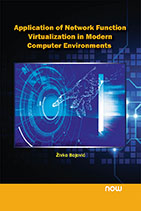Application of Network Function Virtualization in Modern Computer Environments

Downloaded: 34694 times
Description
The Internet's exponential growth is driven by the development and emergence of advanced technologies, attended by a flood of new services. The maturity of these technologies is a decisive factor in the progress of the entire telecom industry, leading to a profound transformation of computer networks from traditional, hardware-centric functions to flexible, software-based solutions. Network function virtualization (NFV), together with software-defined networking (SDN) and cloud computing, are not just key enablers, but they are the basis of more programmable networks that are able to adapt to the evolving requirements of diverse customers, ensuring a promising future for the Internet. This future implies the efficient collaboration of different software components, with the aim of improving flexibility, scalability, and the overall agility of the network. Numerous researchers and professionals today focus their research on finding solutions for the resource, service, security, and other orchestration types and further automation of the processes.
The monograph focuses on the following contents:
• Shortcomings in traditional networks and the primary motives and benefits of NFV implementation in network infrastructure
• Fundamentals and the key components of the ETSI NFV framework
• The virtualization techniques and their application in modern computing environments, with an accent on the characteristics and functionality of virtual entities (virtual machines and containers)
• Containerization technology - creation, characteristics of various containers, and their orchestration and usage of the Kubernetes platform for the management of containerized workloads and services
• The basic principles of NFV-based network design and the path for migration from traditional to NFV-based architecture
• SDN technology, including architecture, protocols, use cases, and integration with NFV in modern networks
• The role of virtualization in the clouds' architectures, types, and delivery models
• Key service chaining strategies and standardized architecture for SFC deployment and SDN/NFV-based architecture for SFC deployment
• The key principles of network slicing in networks with implemented NFV and SDN
The monograph offers a practical blend of theoretical considerations and practical NFV implementation in modern computer environments. It is a valuable resource for students, engineers, and researchers looking for a comprehensive guide to further network softwarization and building a highly programmable, scalable, and software-based network infrastructure.
-
ISBN: 978-1-63828-359-1
296 pp. Open Access (.pdf) This is published under the terms of CC BY-NC
